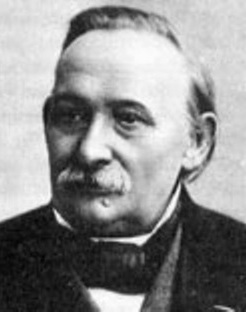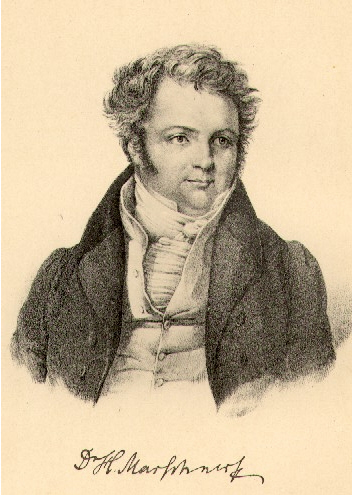|
Das Wandern Ist Des Müllers Lust
"Das Wandern ist des Müllers Lust" ("To wander is the miller's delight") is the first line of a poem by Wilhelm Müller, written in 1821 with the title "Wanderschaft" as part of a collection, ''Die schöne Müllerin''. While ''wandern'' is defined as "hiking" today, it referred to the required journeyman years of craftsmen when written, in this case of a miller. The poem was set to music often, notably by Franz Schubert in 1823 titled "Das Wandern", as part of his song cycle ''Die schöne Müllerin'', and by Carl Friedrich Zöllner, who wrote a four-part setting in 1844. With his melody, the poem became a popular German and . History of the text The beginning of the poetry is based on the play ''Rose, die schöne Müllerin'', which premiered in the house of Friedrich August von Staegemann in Berlin in the fall of 1816. Inspired by Giovanni Paisiellos 1788 opera ''La molinara'', Ludwig Berger wrote the plot as a ''Liedspiel''. Berger requested more texts related to the topic, w ... [...More Info...] [...Related Items...] OR: [Wikipedia] [Google] [Baidu] |
Carl Friedrich Zöllner
Carl Friedrich Zöllner (17 May 1800 – 25 September 1860) was a German composer and choir director. After studying at the Thomasschule zu Leipzig, he started teaching voice. He wrote organ variations on ''God Save the Queen'' and wrote several songs. His son was composer Heinrich Zöllner. References External links * 1800 births 1860 deaths German Romantic composers German choral conductors German male conductors (music) 19th-century classical composers 19th-century conductors (music) German male classical composers 19th-century German composers {{Germany-composer-stub ... [...More Info...] [...Related Items...] OR: [Wikipedia] [Google] [Baidu] |
Otto Nicolai
Carl Otto Ehrenfried Nicolai (9 June 1810 – 11 May 1849) was a German composer, conductor, and one of the founders of the Vienna Philharmonic. Nicolai is best known for his operatic version of Shakespeare's comedy ''The Merry Wives of Windsor'' as '. In addition to five operas, Nicolai composed lieder, works for orchestra, chorus, ensemble, and solo instruments. Biography Nicolai, a child prodigy, was born in Königsberg, Prussia. He received his first musical education from his father, Carl Ernst Daniel Nicolai, who was also a composer and musical director. During his childhood his parents divorced, and while still a youth, early in June 1826, Nicolai ran away from his parents' "loveless" home, taking refuge in Stargard with a senior legal official called August Adler who treated the musical prodigy like a son and, when Nikolai was seventeen, sent him to Berlin to study with Carl Friedrich Zelter. After initial successes in Germany, including his first symphony (1831) ... [...More Info...] [...Related Items...] OR: [Wikipedia] [Google] [Baidu] |
Osnabrück University
Osnabrück University (german: Universität Osnabrück) is a public research university located in the city of Osnabrück in Lower Saxony, Germany. In 2011 it was attended by 11,034 students; the staff of 1,858 consisted of 209 professors, 936 additional academic personnel (lecturers without professorships, post-doctoral researchers and post-graduate assistants) and 713 non-academic personnel.Public Policy and Good Governance Scholarships for Developing Countries along with other reputable institutions in political science and public policy such as the Hertie School of Governance in Berlin and the Willy Brandt School of Public Policy in Erfurt. The program attracts people from Asia, Latin America, and Africa to study in selected German universities for a policy-oriented Master's program. Former President of Germany, Christian Wulff, is an alumnus of the university. History Higher education began in 1632 in Osnabrück when the Gymnasium Carolinum was upgraded into a Jesuit u ... [...More Info...] [...Related Items...] OR: [Wikipedia] [Google] [Baidu] |
Bayerischer Rundfunk
Bayerischer Rundfunk (BR; "Bavarian Broadcasting") is a public-service radio and television broadcaster, based in Munich, capital city of the Free State of Bavaria in Germany. BR is a member organization of the ARD consortium of public broadcasters in Germany. History Bayerischer Rundfunk was founded in Munich in 1922 as Deutsche Stunde in Bayern. It aired its first program on 30 March 1924. The first broadcasts consisted mainly of time announcements, news, weather and stock market reports, and music. Programming expanded to include radio plays, concerts, programs for women, language courses, chess, opera, radio, news, and Catholic and Protestant morning services. Its new 1929 studio was designed by Richard Riemerschmid. Deutsche Stunde in Bayern became Bayerischer Rundfunk in 1931. In 1933, shortly after the Nazi seizure of power, the station was put under the control of the Reich Ministry of Public Enlightenment and Propaganda. After the Allied victory over Nazi Germany, t ... [...More Info...] [...Related Items...] OR: [Wikipedia] [Google] [Baidu] |
Nazi
Nazism ( ; german: Nazismus), the common name in English for National Socialism (german: Nationalsozialismus, ), is the far-right totalitarian political ideology and practices associated with Adolf Hitler and the Nazi Party (NSDAP) in Nazi Germany. During Hitler's rise to power in 1930s Europe, it was frequently referred to as Hitlerism (german: Hitlerfaschismus). The later related term " neo-Nazism" is applied to other far-right groups with similar ideas which formed after the Second World War. Nazism is a form of fascism, with disdain for liberal democracy and the parliamentary system. It incorporates a dictatorship, fervent antisemitism, anti-communism, scientific racism, and the use of eugenics into its creed. Its extreme nationalism originated in pan-Germanism and the ethno-nationalist '' Völkisch'' movement which had been a prominent aspect of German nationalism since the late 19th century, and it was strongly influenced by the paramilitary groups that ... [...More Info...] [...Related Items...] OR: [Wikipedia] [Google] [Baidu] |
Wandervogel
''Wandervogel'' (plural: ''Wandervögel''; English: "Wandering Bird") is the name adopted by a popular movement of German youth groups from 1896 to 1933, who protested against industrialization by going to hike in the country and commune with nature in the woods. Drawing influence from medieval wandering scholars, their ethos was to revive old Teutonic values, with a strong emphasis on German nationalism. According to historians, a major contribution of the ''Wandervögel'' was the revival of folk songs in wider German society. The movement was divided into three main national groups: the ''Alt-Wandervogel'', the ''Wandervogel eingetragener Verein'' (WVEV) and the ''Jung-Wandervogel''. While the two first ones were generally respectful of traditions (family, the military, the school), the ''Jung-Wandervogel'' was more defiant and closer to revolutionary ideas. Contrary to scouting organizations, Wandervögel had spontaneously emerged outside of authority controls, and recruited ... [...More Info...] [...Related Items...] OR: [Wikipedia] [Google] [Baidu] |
Franz Magnus Böhme
Franz Theodor Magnus Böhme (11 March 1827 in Willerstedt – 18 October 1898 in Dresden) was a German academic, musicologist, composer, folksong collector and writer on music history and folksong. Biography The son of a farmer, Böhme became a primary school teacher in Thuringia. He then studied at the Conservatory in Leipzig under Moritz Hauptmann and Julius Rietz. From 1859 to 1878 he was a choirmaster and music teacher in Dresden, before teaching counterpoint and history of music at the Hoch Conservatory in Frankfurt am Main from 1878 to 1885. After 1885 he returned as a professor to Dresden, where he continued to teach. Inspired by the example of Ludwig Uhland and Ludwig Erk, he was an avid collector and publisher of folk tunes, and contributed greatly to the establishment of research into German folk music. Böhme died in 1898 in Dresden, and was buried at the Trinitatisfriedhof (Holy Trinity cemetery). Having died in the former DDR, a great part of his legacy, in particu ... [...More Info...] [...Related Items...] OR: [Wikipedia] [Google] [Baidu] |
Ludwig Erk
Ludwig Christian Erk (6 January 1807, Wetzlar – 25 November 1883, Berlin) was a German musicologist, music teacher, academic, composer and folk-song collector. Bibliography * Friedrich Wilhelm Bautz: Erk, Ludwig Christian. In: Biographisch-Bibliographisches Kirchenlexikon (BBKL). Band 1, Bautz, Hamm 1975. 2., unveränderte Auflage Hamm 1990, , Sp. 1535. * Max Friedlaender: Erk, Ludwig. In: Allgemeine Deutsche Biographie (ADB). volume 48, Duncker & Humblot, Leipzig 1904, S. 394–397. * Walter Salmen Walter Salmen (20 September 1926 in Paderborn – 2 February 2013 in Freiburg im Breisgau) was a German musicologist and university lecturer. Salmen taught from 1958 to 1992 as a professor of musicology at the Saarland University and the Univers ...: Erk, Ludwig Christian. In: Neue Deutsche Biographie (NDB). volume 4, Duncker & Humblot, Berlin 1959, , p. 590 f. (digitalised). * Ernst Schade: Was das Volk zu singen weiss, Ludwig Erk: Leben und Werk eines Liedersammlers, 19 ... [...More Info...] [...Related Items...] OR: [Wikipedia] [Google] [Baidu] |
Allgemeine Musikalische Zeitung
The ''Allgemeine musikalische Zeitung'' (''General music newspaper'') was a German-language periodical published in the 19th century. Comini (2008) has called it "the foremost German-language musical periodical of its time". It reviewed musical events taking place in many countries, focusing on the German-speaking nations, but also covering France, Italy, Russia, Britain, and even occasionally America. Its impartiality and adherence to basic principles of credibility and discretion regarding the personal position of those reviewed, assured and established itself in a high position as a periodical in the musical German society of the time, exercising great influence on the period. History The periodical appeared in two series: a weekly magazine published between 1798 and 1848, and a revived version which lasted from 1866 to 1882. The publisher was Breitkopf & Härtel in Leipzig for the first period of publication and for the first three years of the second period; for the remainde ... [...More Info...] [...Related Items...] OR: [Wikipedia] [Google] [Baidu] |
Gottfried Wilhelm Fink
Gottfried Wilhelm Fink (8 March 1783 – 27 August 1846) was a German composer, music theorist, poet, and a Protestant clergyman. Life From 1804 until 1808 Fink studied theology at the University of Leipzig where he joined the Corps Lusatia. There he made his first attempts at composition and poetry. Most of his song compositions are attributed to this period. From 1811 he held the office of vicar in Leipzig for some years, where he also founded an educational institution which he led until 1829. Since the beginning of the 19th century he worked for the '' Allgemeine musikalische Zeitschrift'' ("General musical magazine"). In 1827 he became the magazine's editor-in-chief, a position he held for 15 years. From 1838 Fink worked as a lecturer at the University of Leipzig. In 1841 he became a ''Privatdozent'' of musicology at the university. In the same year he became a member of the Prussian Academy of Arts in Berlin and a year later he was appointed the music director of th ... [...More Info...] [...Related Items...] OR: [Wikipedia] [Google] [Baidu] |
Heinrich Marschner
Heinrich August Marschner (16 August 1795 – 14 December 1861) was the most important composer of German opera between Weber and Wagner."Marschner's ''Hans Heiling'' From Vienna" WQXR, 26 November 2015 Biography Marschner was born in and was originally intended for a legal career. After a meeting with around 1815–16, he decided to devote himself to music and became a private music teacher in[...More Info...] [...Related Items...] OR: [Wikipedia] [Google] [Baidu] |







